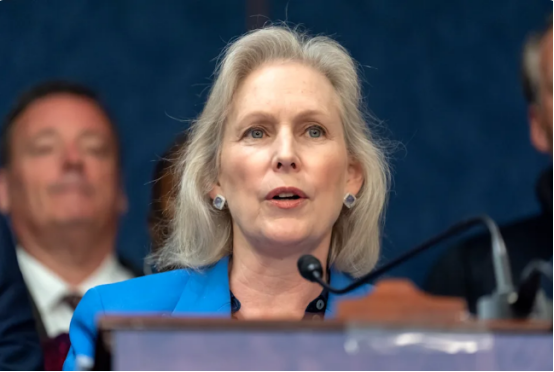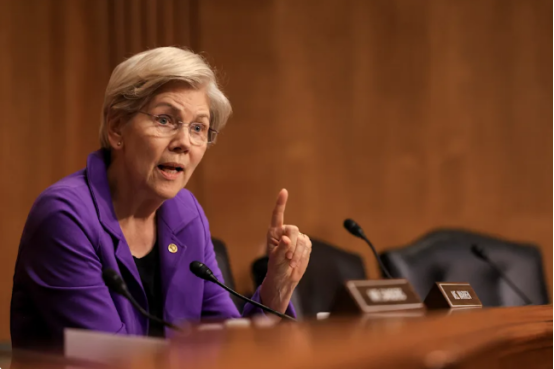
Tue, May 20, 2025
A bill to regulate stablecoins passed a key procedural hurdle in the Senate Monday night, paving a path for final passage of legislation pushed by the crypto industry as early as this week.
The bill still faces hurdles from some Democrats, including Sen. Elizabeth Warren, who argued against the proposed legislation on the floor of the Senate Monday night.
Warren argued the bill doesn’t prohibit President Trump and his family from profiting off stablecoins, nor does it provide enough protections for financial system stability.
Other Democrats, including Sens. Kirsten Gillibrand of New York and Angela Alsobrooks of Maryland, pulled together enough support to keep the bill going and overcome opposition from the Warren camp.
Key Democrats who supported Monday's procedural vote include Sens. Mark Warner of Virginia and Ruben Gallego of Arizona.

Sen. Kirsten Gillibrand, D-N.Y. (AP Photo/Mark Schiefelbein)
Stablecoins are cryptocurrencies pegged to other assets, such as the US dollar, but they would not be protected by any sort of deposit insurance, as bank accounts are. This bill, however, would bar stablecoin accounts from offering interest to depositors — in a win for bank lobbyists.
The Trump family is already in the stablecoin business. World Liberty Financial, a new crypto startup backed by Trump and his sons, last month unveiled plans to mint its own US-dollar-pegged stablecoin in partnership with BitGo.
That stablecoin was then picked as the payment vehicle for a $2 billion investment into Binance from state-owned Abu Dhabi investment firm MGX.
Some Democratic opposition to the bill faded, however, as some argued that the Trump ties to crypto should not stand in the way of establishing rules around stablecoins.
Some in the industry argued that without the regulations outlined in the bill, there could be a repeat of what happened in 2022 when the unregulated algorithmic stablecoin Terra Luna crashed.
That wiped out $60 billion in value, including money held by American consumers, in less than 72 hours.
The Senate will now debate the stablecoin bill while also giving senators the option to offer amendments. From there, the Senate would vote on those amendments and would need another 60 votes to gain cloture to proceed to a final vote on the bill.
The legislation that advanced in the Senate Monday night holds stablecoin issuers to strict reserve requirements, requiring them to maintain one-to-one reserves in cash and cash equivalents. It also bans unbacked, algorithmic stablecoins.
Issuers must comply with monthly public disclosures of reserves. Issuers with $50 billion or more in total issuance must submit annual audited financial statements and disclose affiliated transactions to regulators.
It also includes a broad savings clause guaranteeing the application of existing federal consumer protection laws, including but not limited to the protections extended by the Consumer Financial Protection Bureau and the Federal Trade Commission.

U.S. Senator Elizabeth Warren (D-MA). REUTERS/Kevin Mohatt/File Photo.
The bill also closes a loophole that could have allowed non-permitted offshore stablecoin issuers to offer their products on US-regulated exchanges and empowers the Treasury secretary to delist non-compliant foreign issuers.
Foreign stablecoin issuers in the US will be subject to the same rules as domestic issuers. One current issuer based outside the country, Tether, would either need to make its entire business compliant or create a US subsidiary that is in compliance.
Stablecoin issuers will also be held to bank-like standards regarding anti-money-laundering requirements, sanctions compliance, and requirements under the Bank Secrecy Act.
The bill also prohibits Big Tech companies like Meta (META) and Amazon (AMZN) from issuing stablecoins unless they can meet strict criteria regarding financial risk, consumer data privacy, and fair business standards.
The bill’s sponsor, Sen. Bill Hagerty, has said that Citigroup estimates that a US regulatory framework for stablecoins would drive significant new demand for US Treasurys, which could make them the largest combined holders of Treasurys by 2030.
Currently, if combined, all current US dollar-denominated stablecoins would be the 14th-largest sovereign holder.
Some Democrats criticized that the bill still provides foreign-issued stablecoins, like Tether, multiple avenues to access US markets while evading the bill’s basic regulatory requirements.
They also contend that if enacted in its current form, consumers may have fewer basic protections when using stablecoins than they do when using Venmo or their bank account.